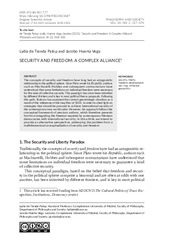Приказ основних података о документу
Security and Freedom: A Complex Alliance
Bezbednost i sloboda: složen savez
| dc.creator | Tienda Palop de, Lydia | |
| dc.creator | Huerta Vega, Jacobo | |
| dc.date.accessioned | 2023-07-14T08:59:34Z | |
| dc.date.available | 2023-07-14T08:59:34Z | |
| dc.date.issued | 2023 | |
| dc.identifier.issn | 0353-5738 | |
| dc.identifier.uri | https://journal.instifdt.bg.ac.rs/index.php/fid/article/view/1569 | |
| dc.identifier.uri | http://rifdt.instifdt.bg.ac.rs/123456789/2861 | |
| dc.description.abstract | The concepts of security and freedom have long had an antagonistic relationship in the political sphere. Since Plato wrote his Republic, authors such as Machiavelli, Hobbes and subsequent contractarians have understood that some limitations on individual freedom were necessary for the sake of collective security. This paradigm has since been inherited by different thinkers and is key in most political theory proposals. Following this path, Todorov has analyzed the current geostrategic situation as a result of the milestone of the Iraq War of 2003, in order to shed light on strategies that should be pursued to achieve international security of the contemporary new world order. However, his approach follows the conceptual framework of previous authors, which therefore prevents him from integrating the freedom required by contemporary Western democracies with international security. In this article, we intend to provide an alternative perspective, addressing the problem from a multidimensional conceptualization of security and freedom. | sr |
| dc.description.abstract | Pojmovi bezbednosti i slobode odavno stoje u antagonističkom odnosu u političkoj sferi. Otkako je Platon osmislio Državu, autori poput Makijavelija, Hobsa i kasnijih kontraktarijanaca razumeli su da su neka ograničenja individualne slobode nužna zarad kolektivne bezbednosti. Ovu su paradigmu usvojili različiti mislioci i ključna je za većinu političko-teorijskih stanovišta. Na tom tragu, Todorov analizira aktuelnu geostratešku situaciju kao rezultat prekretnice koju je predstavljao rat u Iraku 2003. godine, da bi osvetlio strategije koje su neophodne za međunarodnu bezbednost u savremenom novom svetskom poretku. Međutim, njegov pristup sledi pojmovni okvir ranijih autora, što mu onemogućava da integriše međunarodnu bezbednost i slobodu kakvu podrazumevaju savremene zapadne demokratije. U ovom članku nameravamo da ponudimo alternativnu perspektivu, pristupajući ovom problemu kroz multidimenzionalnu konceptualizaciju bezbednosi i slobode. | sr |
| dc.language.iso | en | sr |
| dc.publisher | Beograd : Institut za filozofiju i društvenu teoriju | sr |
| dc.rights | openAccess | sr |
| dc.rights.uri | https://creativecommons.org/licenses/by-nc-nd/4.0/ | |
| dc.source | Filozofija i društvo / Philosophy and Society | sr |
| dc.subject | security | sr |
| dc.subject | liberty | sr |
| dc.subject | freedom | sr |
| dc.subject | development | sr |
| dc.subject | war | sr |
| dc.subject | Iraq | sr |
| dc.subject | influence | sr |
| dc.subject | geopolitics | sr |
| dc.title | Security and Freedom: A Complex Alliance | sr |
| dc.title | Bezbednost i sloboda: složen savez | sr |
| dc.type | article | sr |
| dc.rights.license | BY-NC-ND | sr |
| dc.citation.issue | 2 | |
| dc.citation.volume | 34 | |
| dc.citation.spage | 318 | |
| dc.citation.epage | 333 | |
| dc.identifier.doi | 10.2298/FID2302318T | |
| dc.type.version | publishedVersion | sr |
| dc.identifier.fulltext | http://rifdt.instifdt.bg.ac.rs/bitstream/id/9877/bitstream_9877.pdf |

